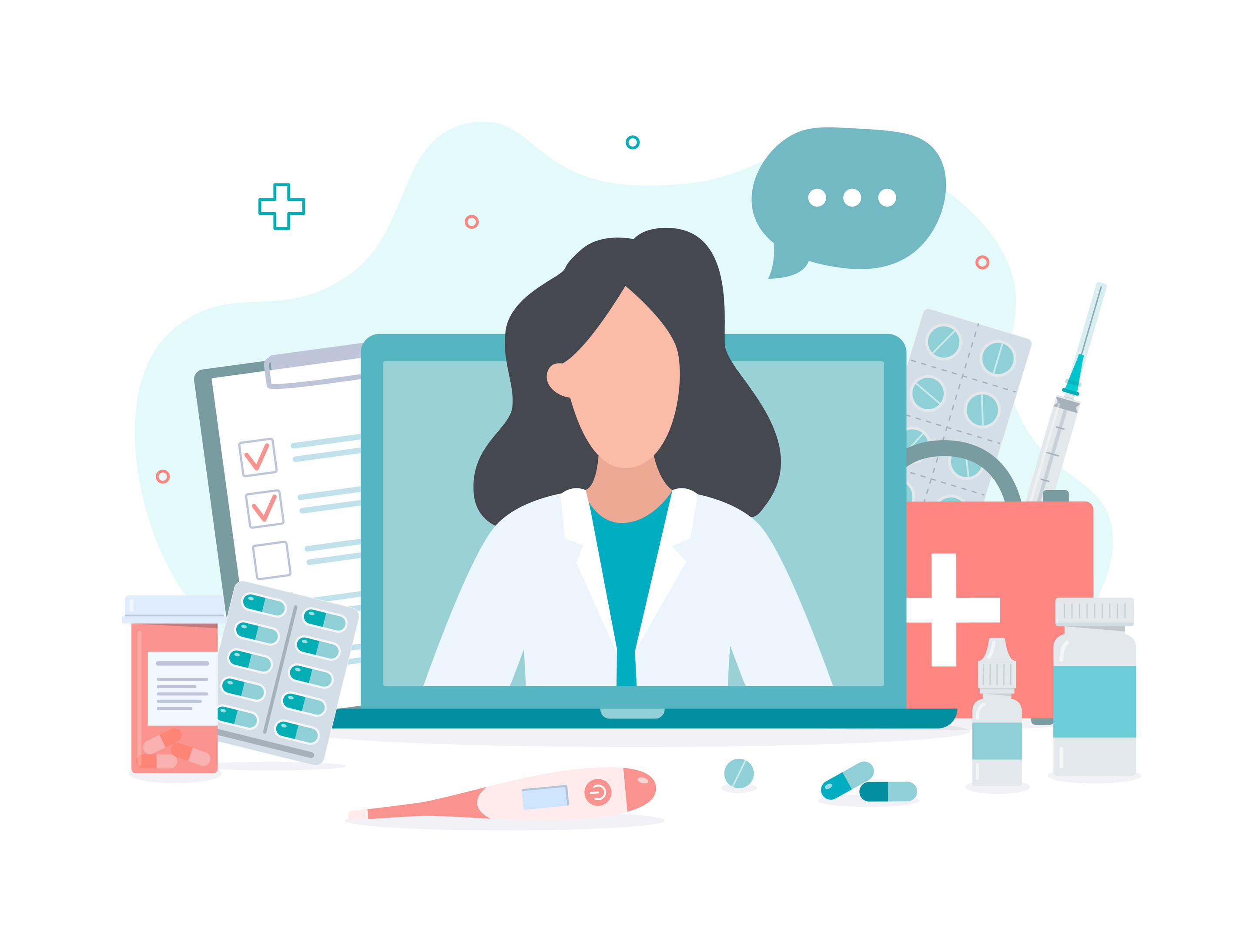
(From left) Doctoral student Hannah Yamagata, research assistant professor Kushol Gupta, and postdoctoral fellow Marshall Padilla holding 3D-printed models of nanoparticles.
(Image: Bella Ciervo)

If Vanessa Stoloff was told a month ago how much Penn’s Student Health Service would change in just a few short weeks, she wouldn’t have believed it. With a full revamp under their belt, Stoloff, the department’s senior medical director, and her team, are proud to be serving the University’s students near or far—in ways that were never even thought possible.
“We’re still here, keeping students safe, keeping campus safe, keeping staff safe. We didn’t really skip a beat,” Stoloff says, chatting over the phone. “It just looks a little different.”
Student Health Service, which provides the full student body quality and affordable health care—from primary to gynecologic care to nutrition and sexual health—is laser-focused on the students still on campus and in the Philadelphia area, as well as the thousands of Penn students who now span the world. A limited in-the-office crew rotates every 14 days, and all staff have the capability to work remotely.
“We are evaluating by phone if it is something we can manage from afar, or if a student should be brought into the office, taking into consideration that everyone is safer at home right now,” Stoloff says.
It is a similar story for other programs within the student wellness umbrella, too, including Counseling and Psychological Services, or CAPS, as well as Campus Health.
“Even as everyone’s normalcy has been interrupted, we’ve been able to adapt,” says Chief Wellness Officer Benoit Dubé. “We’ve been able to continue supporting students.”
The CAPS team, who addresses students’ mental health needs, have been able to transform the majority of their services to remote functioning. Whether a student has been regularly receiving care through CAPS or not, all counselors are available virtually—either over the phone or through HIPAA-approved video conferencing. With a new behavioral health consultant position filled earlier this year, CAPS also maintains an on-the-ground presence physically at Student Health Service, should a student on campus need in-person evaluation or care.
“We have seen a little bit less traffic than we would normally see at this time,” says Michal Saraf, CAPS’ senior clinical director. “But students are still getting settled into this new world, and mental health might not yet be on their radar. What’s most important is that they know we’re here whenever they are ready.”
Dealing with the undoubted stress of COVID-19 in particular, Saraf says she and her team are trying to help students manage fear, and make reasonable choices from a health and mental health perspective. A variety of tips for coping with the pandemic—impacting us all—are listed on the CAPS website.
A bit of an ironic silver lining, Saraf suggests, is that of a “greater connection” that is being developed between CAPS clinicians and students, even while apart. “We are all having to meet these challenges in our lives,” says Saraf. “Sometimes acknowledging that connection can be a point of increased understanding.”
CAPS, already offering online “mindfulness skills” and “yoga for mental health” groups, is adjusting its outreach and prevention division to operate remotely, too, which includes translating I CARE trainings to the virtual domain.
Ashlee Halbritter, director of Campus Health, the University’s own public health arm, notes a bit of a head start her office has already taken technology-wise—dating back at least two years—to move more programming online, furthering student reach. Health education offerings and interventions touching on sleep wellness and sexual health have already been rolled out, tested, and improved, and now, as more and more content shifts to be remote, make for great examples to build off of.
In the midst of a worldwide pandemic, Campus Health’s staff is especially active in conducting complex disease surveillance. Tracking every coronavirus case affecting students on and off campus, Halbritter and her team do full-contact investigations and contact tracing, assessing exposure risk to people and places on and around Penn and responding accordingly. In addition, Campus Health and Student Health Service are working closely to continuously check in with students and offer support and education along the way.
“With communicable diseases, and reporting, sometimes it can be scary,” says Halbritter. “But the important thing for students to know is that they are never in trouble. This is about us working with them to help protect as many members of the Penn community as possible.”
Halbritter, along with Stoloff and Saraf, all agree that their respective offices have never worked more collaboratively than they are during this unprecedented time.
“We talk every day,” says Saraf.
“It’s really brought us closer,” adds Stoloff. “And because of that, we’ve all been able to really maintain all of our missions without any interruption, even if nothing looks like it did a month ago.”
Just as Penn President Amy Gutmann urged the Penn community this week to “find meaning amid misfortune,” Stoloff says she is staying positive, taking each change presented and running with it.
“A situation like this opens up these avenues, providing virtual wellness, virtual health care,” she says. “The technological world is pretty cool.
“Even though there is such value in meeting in-person, and I’m definitely hoping to get back to normal soon, it does present opportunities moving forward for telehealth and telemedicine,” Stoloff says. “If life gives you lemons, right?”
Lauren Hertzler

(From left) Doctoral student Hannah Yamagata, research assistant professor Kushol Gupta, and postdoctoral fellow Marshall Padilla holding 3D-printed models of nanoparticles.
(Image: Bella Ciervo)

Jin Liu, Penn’s newest economics faculty member, specializes in international trade.
nocred

nocred

nocred